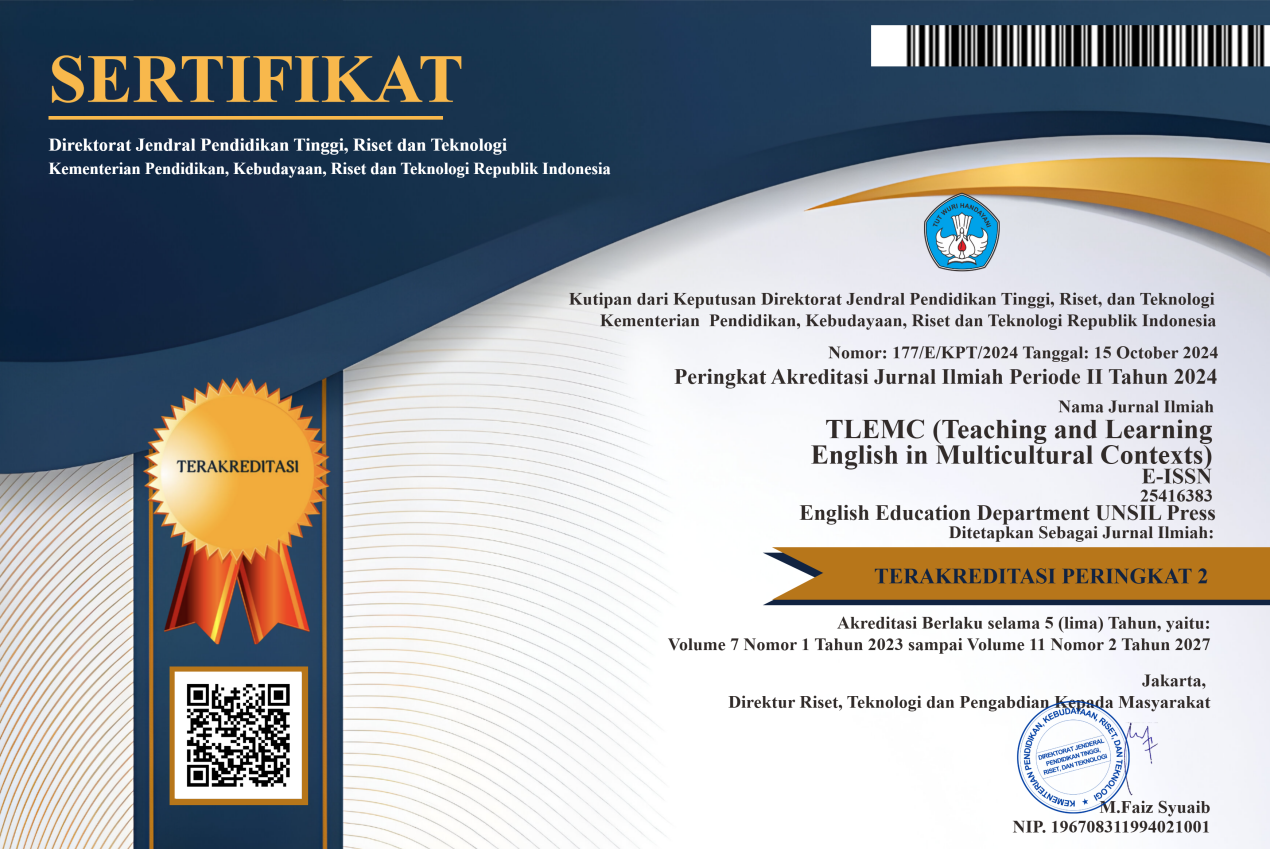Unveiling Students’ Experience with Project-Based Learning in Higher Education
Abstract
Project-Based Learning (PjBL) has garnered considerable attention as an innovative pedagogical technique that fosters active participation, analytical reasoning, and tangible utilization of acquired knowledge. This study explores the experience of undergraduate students focusing on the benefits, challenges and coping strategies during the implementation of project-based learning (PjBL) in an ESP course. Involving 45 English Education Department students as the participants, this mixed methods study utilized questionnaire and semi-structured interviews to obtain the data regarding their experience while joining PjBL. The quantitative data from the questionnaire were analysed by using descriptive statistics, while the qualitative data from the interview were analysed through the steps of data condensation, data display, and conclusion drawing. The results of this research indicate that students recognized the roles of PjBL in enhancing their learning motivation, engagement, understanding, language proficiency, problem solving, critical thinking, creativity, and collaboration skills. However, this study also reported significant challenges regarding time constraints, resourcing difficulties, and collaboration issues. To address these challenges, students employed various strategies such as managing tasks independently, utilizing accessible resources, and maintaining effective communication. This study concludes that when carefully implemented, PjBL can be an effective instructional method in ESP contexts that offers meaningful opportunities for both linguistic and personal development.
Keywords: Project based Learning, learning experience, higher education, ESP
Full Text:
PDFReferences
Bell, S. (2010). Project-based learning for the 21st century: Skills for the future. The Clearing House, 83(2), 39–43. https://doi.org/10.1080/00098650903505415
Chi, D. N. (2023). Benefits of implementing project-based learning in an English for business course. Journal of Ethnic and Cultural Studies, 10(3), 55–71. https://doi.org/10.29333/ejecs/1549
Guo, P., Saab, N., Post, L. S., & Admiraal, W. (2020). A review of project-based learning in higher education: Student outcomes and measures. International Journal of Educational Research, 102, 101586. https://doi.org/10.1016/j.ijer.2020.101586
Haatainen, O., & Aksela, M. (2021). Project-based learning in integrated science education: Active teachers’ perceptions and practices. LUMAT : International Journal on Math, Science and Technology education, 9(1), 149–173. https://doi.org/10.31129/LUMAT.9.1.1392
Helle, L., Tynjälä, P., & Olkinuora, E. (2006). Project-based learning in post-secondary education - Theory, practice and rubber sling shots. Higher Education, 51(2), 287–314. https://doi.org/10.1007/s10734-004-6386-5
Hidayati, D., Novianti, H., Khansa, M., Slamet, J., & Suryati, N. (2023). Effectiveness project-based learning in ESP class: Viewed from Indonesian students‘ learning outcomes. International Journal of Information and Education Technology, 13(3), 558–565. https://doi.org/10.18178/ijiet.2023.13.3.1839
Hmelo-Silver, E., C. (2004). Problem-based learning: What and how do students learn? Educational Psychology Review, 16(3), 235–266. https://doi.org/1040-726X/04/0900-0235/0
Jalinus, N., Nabawi, R. A., & Mardin, A. (2017). The seven steps of project based learning model to enhance productive competences of vocational dtudents. 1st International Conference on Technology and Vocational Teachers (ICTVT 2017), 102, 251–256. https://doi.org/10.2991/ictvt-17.2017.43
Jones, B. (2019). Good practice: Scaffolded, collaborative project-based learning. Journal of the European Honors Council, 3(1), 1–16. https://doi.org/10.31378/jehc.85
Kavlu, A. (2020). The effect of project-based learning on first-year undergraduate students in English for Specific Purposes (ESP) courses. International Journal of English Linguistics, 10(4), 227–239. https://doi.org/10.5539/ijel.v10n4p227
King, B., & Smith, C. (2020). Using project-based learning to develop teachers for leadership. The Clearing House: A Journal of Educational Strategies, Issues and Ideas, 93(3), 158–164. https://doi.org/10.1080/00098655.2020.1735289
Krajcik, J. S., & Shin, N. (2014). Project-based learning. In R. K. Sawyer (Ed.), The Cambridge Handbook of the Learning Sciences, Second Edition (2nd ed., hal. 275–297). Cambridge University Press. https://doi.org/10.1017/CBO9781139519526.018
Krisdianata, Y. Y., & Larasati, R. (2025). All That I Studied Gave Me a Clearer Goal” Students’ Voice: Project-Based Learning in ESP Course. ETERNAL (English Teaching Journal), 16(1), 1-11. https://doi.org/10.26877/eternal.v16i1.960
Land, S. M., & Greene, B. A. (2000). Project-based learning with the world wide web: A qualitative study of resource integration. Educational Technology Research and Development, 48(1), 45–66. https://doi.org/10.1007/bf02313485
Larmer, J., Mergendoller, J. R., & Boss, S. (2015). Setting The standard for project based learning. In Engineering (Nomor 1–2). ASCD. http://www.ascd.org/memberbooks
Milentijevic, I., Ciric, V., & Vojinovic, O. (2008). Version control in project-based learning. Computers and Education, 50(4), 1331–1338. https://doi.org/10.1016/j.compedu.2006.12.010
Munianti, S., & Syukri, S. (2022). EFL students’ perception on strengths and weaknesses of group working in project-based learning. Al Lughawiyaat, 2(1), 17–25. https://doi.org/10.31332/alg.v2i1.2891
Musa, F., Mufti, N., Latiff, R. A., & Amin, M. M. (2011). Project-based learning: Promoting meaningful language learning for workplace skills. Procedia - Social and Behavioral Sciences, 18, 187–195. https://doi.org/10.1016/j.sbspro.2011.05.027
Puangpunsi, N. (2021). Learners’ perception towards project-based learning in encouraging English skills performance and 21st century skills. Thaitesol Journal, 34(1), 1–24. https://so05.tci-thaijo.org/index.php/thaitesoljournal/article/view/252353/170758
Shaalan, I. E.-N. A. W. (2020). Integrating project-based learning strategies in the design of an ESP dental vocabulary course for ESL Malaysian majors. Arab World English Journal, 11(3), 464–483. https://doi.org/10.24093/awej/vol11no3.29
Silvani, D., Santiana, & Syakira, S. (2023, July). Project Based Learning in an ESP Class: Voices from Indonesian EFL Students. In Conference on English Language Teaching (pp. 330-342).
Stoller, F. L., & Myers, ceAnn C. (2019). Project-based learning: A five-stage framework to guide language teachers. In G.-V. Adrian (Ed.), Project-Based Learning in Second Language Acquisition (hal. 25–47). Routledge. https://doi.org/10.4324/9780429457432
Sumarni, W. (2015). The strengths and weaknesses of the implementation of project based learning: A review. International Journal of Science and Research, 4(3), 478–484. https://doi.org/10.1007/978-3-319-95258-1_5
Tal, T., Krajcik, J. S., & Blumenfeld, P. C. (2006). Urban schools’ teachers enacting project-based science. Journal of Research in Science Teaching, 43(7), 722–745. https://doi.org/10.1002/tea.20102
Thomas, J. W. (2000). A review of research on project-based learning. The Autodesk Foundation. http://www.bie.org/research/study/review_of_project_based_learning_2000
Tsybulsky, D., & Muchnik-Rozanov, Y. (2019). The development of student-teachers’ professional identity while team-teaching science classes using a project-based learning approach: A multi-level analysis. Teaching and Teacher Education, 79, 48–59. https://doi.org/10.1016/j.tate.2018.12.006
DOI: https://doi.org/10.37058/tlemc.v9i1.16606
Refbacks
- There are currently no refbacks.
INDEXED BY:
This work is licensed under a Creative Commons Attribution-NonCommercial-ShareAlike 4.0 International License.
![]()
TLEMC (Teaching and Learning English in Multicultural Contexts)
Program Studi Pendidikan Bahasa Inggris
Fakultas Keguruan dan Ilmu Pendidikan
Universitas Siliwangi
Jl. Siliwangi No. 24 Kota Tasikmalaya - 46115
email: tlemc@unsil.ac.id





